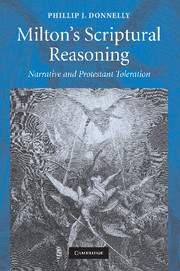Book contents
- Frontmatter
- Contents
- Preface and acknowledgments
- Abbreviations and editions
- 1 Introduction: Scriptural reasoning
- PART I SCRIPTURAL REASONING IN MILTON'S PROSE
- PART II BIBLICIST RHETORIC AND ONTOLOGY IN PARADISE LOST
- PART III BIBLICIST POETICS AND HERMENEUTIC ETHICS
- Notes
- Subject index
- Index of Scripture references
Preface and acknowledgments
Published online by Cambridge University Press: 04 September 2009
- Frontmatter
- Contents
- Preface and acknowledgments
- Abbreviations and editions
- 1 Introduction: Scriptural reasoning
- PART I SCRIPTURAL REASONING IN MILTON'S PROSE
- PART II BIBLICIST RHETORIC AND ONTOLOGY IN PARADISE LOST
- PART III BIBLICIST POETICS AND HERMENEUTIC ETHICS
- Notes
- Subject index
- Index of Scripture references
Summary
This study began as an attempt to correct an error in my previous treatment of Milton in Rhetorical Faith: The Literary Hermeneutics of Stanley Fish. In order to investigate Fish's general theoretical claims, my analysis had, for the sake of argument, granted his interpretation of Milton as a matter of course. As a result, however, Rhetorical Faith ended up characterizing Milton as a modern rationalist who tended toward a quasi-Cartesian view of reason as a form of mastery. My argument had also, consequently, misconstrued Milton's biblical hermeneutics. Only through a careful study of the hermeneutics implied by the biblicism in Milton's major poetry did I begin to appreciate why my previous characterization of Miltonic reason had been more misleading than helpful.
As my new investigation unfolded, however, I realized that many Milton critics, most notably those who had set themselves in direct opposition to Fish, also shared the assumption that “reason” is necessarily a form of mastery, rather than a capacity for peaceful participation in a reality whose goodness is a gift. As a result, many critics, in arguing against Fish and contending that Milton does not share in the modern view of reason, end up imputing to Milton a contrasting insistence upon the primacy of chaos or indeterminacy. In both cases, however, there is a tendency to assume that sheer necessity and arbitrary randomness exhaust the available alternatives in Milton's view of reality.
Information
- Type
- Chapter
- Information
- Milton's Scriptural ReasoningNarrative and Protestant Toleration, pp. vii - ixPublisher: Cambridge University PressPrint publication year: 2009
